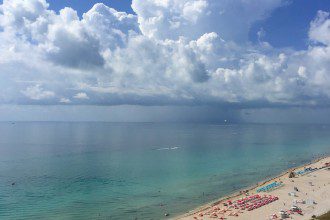The voice in an air traffic control tower carries the weight of trust. One misplaced phrase, one distracted moment, could disrupt the rhythm of hundreds of lives in the air. Richard H. Mansure III spent his career mastering that exacting calm, first with the U.S. Air Force, then as a private contract controller, and later within the Federal Aviation Administration.
For years, he directed aircraft across multiple continents with surgical steadiness. That same discipline now defines his newest endeavor, though it takes place far from the runway and deep within the shower.
HARP, his creation, was born from irritation, literal irritation. Mansure had battled dry skin for years. Each morning, he reached for liquid body washes that promised hydration but delivered disappointment. They foamed poorly, demanded loofahs that collected bacteria, and left plastic waste piled in bathroom bins. The few bar soaps he tried stripped his skin even further. Something was wrong, and his meticulous eye for quality began investigating why.
He discovered that traditional soaps rely on saponification, a method dating back thousands of years that uses lye to turn fats into cleansers. It’s cheap, efficient, and harsh. “The truth is, soaps haven’t changed in centuries,” Mansure said. “They still rely on ingredients like Lye that disrupt the skin’s balance.” That realization ignited a different kind of mission: to reformulate cleansing itself.
The Science of Gentleness
While studying formulations, Mansure encountered a class of cleansers known as synthetic detergents, also referred to as Syndets. Unlike soaps, they’re created without lye and can be carefully balanced to match the skin’s natural acidity, which typically ranges from a pH of 5 to 6. Chemists had developed them decades ago for sensitive skin, face care, and newborn care, but they remained rare in body products due to their higher cost.
Mansure saw the gap immediately. While corporations had optimized for profit, he chose to optimize for skin health. HARP began with the essentials: pure, pH-balanced cleansing bars that mirror the science of premium facial care. Only after those staples were perfected did he expand the line to include the retinol series, each formulated with clinical precision to renew and protect the skin. A new class of cleansers was born; not soaps, but body washes in bar form. No saponified oils, no fillers, no preservatives, just refined ingredients: retinol for cell turnover, niacinamide for barrier repair, vitamin E for defense, and hyaluronic acid for deep hydration.
The result feels different in the hand: dense, smooth, and fast-lathering without that chalky residue most bars leave behind. Its fragrance-free variant carries only the faint scent of its natural ingredients, like an unscented candle. “It’s like using a luxury face cleanser, but for your entire body,” Mansure said. That guiding phrase-‘Treat your body like you treat your face’-became HARP’s rallying cry.
Each bar is professionally manufactured under cGMP standards, the same protocols used in pharmaceutical production. Mansure insists on it. “Anyone can make soap in their kitchen,” he said, “but you can’t make what we make without precision equipment and quality control.”
Legacy in a Bar

The story of HARP carries an echo from Mansure’s family history. Before he guided aircraft through the skies, his relatives owned a respected menswear brand in the Wilmington, Delaware area, Mansure & Prettyman, a line known for fine suits and business attire that endured for generations before closing around 2000. Reviving that name became his way of continuing the legacy. Naming his company after that lineage was his way of reclaiming it. The same commitment to craft that once measured the line of a lapel now defines the smooth curve of a cleansing bar.
That connection to heritage blends with Mansure’s broader philosophy. Decades of managing flight operations taught him that perfection isn’t optional; it’s survival. The same principle drives every batch of HARP. From ingredient sourcing to packaging, the process mirrors the urgency of ATC radar operations. Each detail is verified, each formulation tested for pH consistency.
In an era where cheap often outweighs care, HARP’s existence feels almost defiant. The bar-soap category had declined as consumers turned to bottled cleansers, yet it’s now experiencing a resurgence. Consumers are becoming aware of how packaging waste and saponified oils’ impact both their bodies and the planet. HARP stands firmly in that realization; its bars promote skin harmony, environmental mindfulness, and a renewed respect for the body as a whole. Mansure reminds us that well-being doesn’t end at the face; it begins with every inch of skin we live in.
The brand’s founder remains realistic yet ambitious. He sells thousands of bars a month, each one a small reminder that patience and precision still matter in a hurried marketplace. “In my previous role, everything had to be perfect every time,” he said. “That’s how I run HARP, every bar should perform exactly as intended.”
Mansure’s aim isn’t to be the cheapest product on supermarket shelves. His goal is continuity through quality: to build a company worthy of passing to his children, just as his forebears once passed their craft down through tailored suits. Whether guiding aircraft or guiding a brand, he remains steady, driven by the same quiet discipline that keeps both sky and skin in balance.






